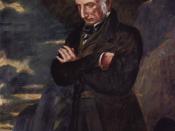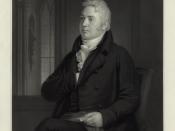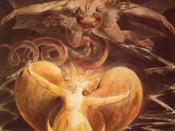Romantic writing was called 'Romantic' (with a capital 'R') because it was, like the 'romantic' as in romantic love, concerned with yearning, the mysterious, the irrational, and with transcending everyday life. 'Romantic' also came to be used to describe a group of writers from around the turn of the eighteenth century whose work demonstrated such a belief that life could be lived by ideals rather than rules. Romantic writing has been defined in a number of ways: for example, as a response to the political revolutions of the last decade of the eighteenth century, or as a reaction to Classicism. The first is a definition which relates the writing to its historical context; the second is a formal or aesthetic definition. As a formal or aesthetic movement, the tendencies of Romanticism were generalized by René Wellek in 1963; he identified the three criteria that are central for one aspect of the practice of Romantic literature: "imagination for the view of poetry, nature for the view of the world, and symbol and myth for poetic style" (Wellek, p.327).
British Romanticism was defined as poetry mostly having been written by just six male English poets, from two generations. The first generation includes: William Blake, William Wordsworth and Samuel Taylor Coleridge; the second includes: Lord Byron, Percy Bysshe Shelley and John Keats. Almost all of the Romantic poetry shared some specific characteristics or notions such as: the assertion of the powers of the self; the assertion of the validity of strong feelings (e.g. A Poison Tree by Blake); a dissatisfaction with the ordinary world and the desire to transcend it (e.g. Composed upon Westminster Bridge by Wordsworth); the glorification of childhood (Wordsworth's Lucy). For the Romantic poets, children were often seen as truly uncorrupted and as closer to nature - and nature...


